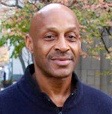 Leroy Orange Authorities responding to a report of a fire in an apartment building on the south side of Chicago early the morning of January 12, 1984, discovered the bodies of three adults and a child who had been bound, gagged, and stabbed to death. Within hours, police arrested half-brothers Leonard Kidd and Leroy Orange, who had been at the apartment with the victims the previous night. Kidd attributed the crime to Orange, whose former girlfriend and 10-year-old son were among the victims.
Orange initially professed innocence, saying he had left the victims in good health, but he signed a confession after 13 hours of interrogation by white police officers later shown to have engaged in torture of African American suspects. Both men were indicted.
Their cases were severed. At Orange’s trial, in the spring of 1985, the prosecution’s case rested almost entirely on his confession, which he testified had been extracted by torture — beating, suffocation, and electroshock. Against the advice of counsel, Kidd took the stand and testified that he alone committed the quadruple murder after a night of drinking, snorting cocaine, and smoking marijuana. Believing neither man, the jury found Orange guilty, and Judge Arthur J. Cieslik sentenced him to death. Three months later, Kidd pleaded guilty and also was sentenced to death by Cieslik.
After Orange’s conviction was affirmed, his attorneys filed a petition for post-conviction relief, alleging that he had been deprived of effective assistance of counsel. His trial lawyer, Earl Washington, had failed to investigate extensive evidence that would have supported his torture claim. Judge Daniel M. Locallo dismissed the petition without a hearing.
Over the years, scores of other defendants raised similar claims of torture, including mock executions, electric shocks to genitals from a hand-cranked generator, and beatings. In one case, a suspect suffered burns after he was strapped naked to a radiator until he confessed.
The allegations of torture all focused on Lt. Burge and detectives under his command, who had become known as the “Midnight Crew” because they worked the night shift.
Burge ultimately was fired.
On January 10, 2003, while an appeal was pending, Governor George H. Ryan granted Orange a full pardon based on innocence, criticizing the prosecutors and judiciary for relying on “procedural technicalities at the exclusion of the quest for truth.” Ryan also commuted Kidd’s sentence to life without parole. Ryan also pardoned Aaron Patterson, Madison Hobley and Stanley Howard—all of whom asserted they had been tortured as well.
In 2010, Burge was convicted in U.S. District Court in Chicago of perjury for denying torture allegations during questioning in federal lawsuits brought by other torture victims. He was sentenced to 4½ years in prison.
As part of the re-examination of the torture allegations, the Illinois Torture Inquiry and Relief Commission was established to investigate claims of police torture.
In 2007, a federal civil rights suit brought against the police by Orange was settled for $5.5 million. He also received $525,000 from the county and $161,005 in state compensation.
— Rob Warden
|